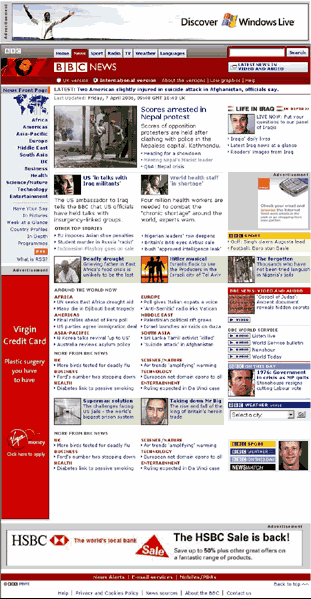BIPA comes out against BBC web advertising
I don't very often end up on the same side as BIPA, the lobbying wing of Britain's big commercial internet media companies, but at the moment I find myself very much in agreement with them.
The BBC Trust is this week widely expected to rule on whether the BBC should have adverts on international facing websites, and is also expected to say yes to the idea. I've already had my say about it here on currybetdotnet - 5 reasons why the BBC's international news site shouldn't take advertising - and last week BIPA came out with the reasons that they would rather the BBC Trust said no.
Significantly, BIPA considered not just that it would have:
"a serious negative impact on all UK publishers, most of whom depend on the growing online advertising market for their revenue models"
but chairman Hugo Drayton also said that allowing advertising would be:
"undermining the Corporation's worldwide reputation for integrity and impartiality"
Here, BIPA find themselves in a rag-bag alliance against the move consisting of them, unions, concerned BBC staff and the BBC's audience. Here is a sample of the user reaction when the BBC published a web forum thread asking their audience what they thought of the move
"It is with great regret that I see you are contemplating the sacrifice of the BBC's worldwide reputation for accuracy, impartiality, and excellence on the altar of commercial profit."
"Adverts affect independence. How soon would it be before a story gets either changed or spiked when it potentially offends a big advertiser on the site?"
"When I read the headline I thought Ads on the BBC website, sure, whats the problem. Then I opened the sample picture showing what it could look like. I changed my mind in a second. It seemed odd and, well, cheap! I guess sometimes you don't realise what you have, until it's covered with ads."

"As a reader, I'd simply lose most (if not all) trust in the BBC's independence."
"Reporting from the BBC additionally promotes British use of English, British culture and British perspectives and is among a limited number of exports that brings the nation respect and maintains its international significance. The BBC should not be underestimated nor undermined."
"The last thing the earth needs is another for profit news service."
"This is about the last site that is serious about giving just news, why do you want to ruin it? Just because we are not in the UK?"
"The BBC is without doubt the envy of the world. It is considered un-biased, honest and fair - these are seen as "it's" values. Would if be possible for the BBC to incorporate advertising and still retain these values? Without diluting any of them? Would it be possible to ensure editorial integrity?"
"Ads make everything feel like its for sale, and news should be and feel impartial."
"The BBC does not carry advertisements on the World Service. I fail to see the difference between the International web site and the World Service, in that they both seek to reach an International audience."
Sadly, I don't hold out much hope that the BBC Trust will be following BIPA's advice, or the wishes of the BBC's worldwide audience, later this week
That picture shows exactly how I would hope the BBC News site with ads would NOT look like.
For the record - the leaderboard on the bottom won't be seen nor clicked-on, so nobody would ever put one there; and the skyscraper on the left-hand-side is an out-dated and un-fashionable size which doesn't work for most clients.
There's so much wrong with this, it's hard to fathom. Any addition of ads would also come with a redesign, because ads slapped onto a previously ad-free page simply don't work. It's far more likely that a 'BBC News with ads' would have an MPU in it (a 300x250 'tv-screen' size ad). And that a site redesign would also take into account that 90% of computer users have a 1024x768-or-greater screen resolution, and therefore make more room for the content.
By inexpertly plastering three sets of ads around the content in a haphazard and ugly way, anyone with a brain would say no to this. Which is presumably what the survey wanted. Not that I'd ever accuse BBC staff of bias.
>> Not that I'd ever accuse BBC staff of bias.
Indeed, I mean who would give creedence to such an outlandish idea :-)
I am an Indonesian.
can This page more completes